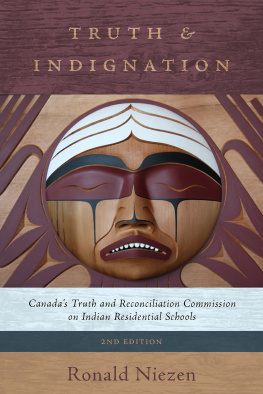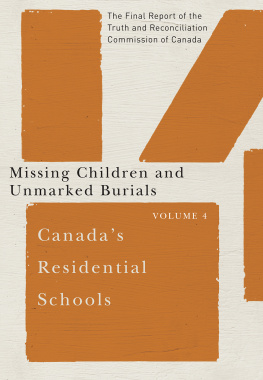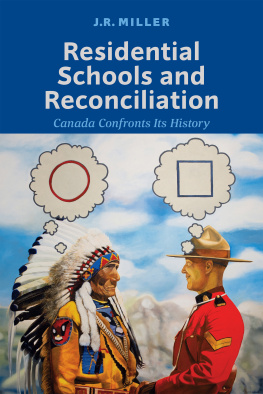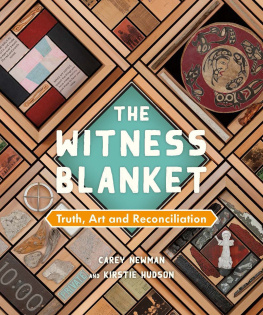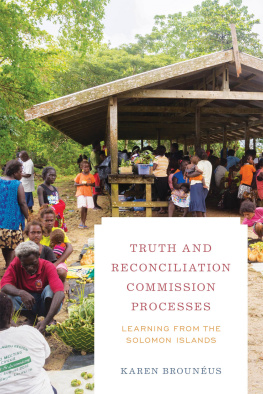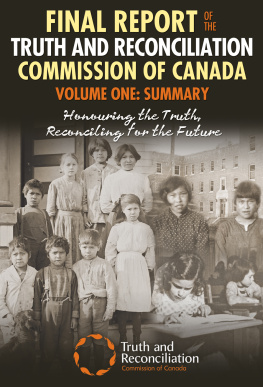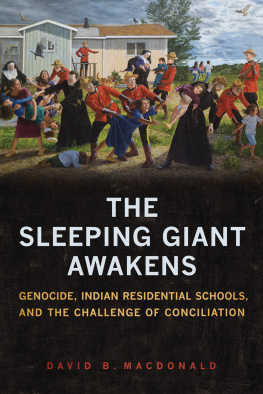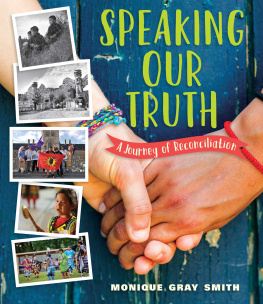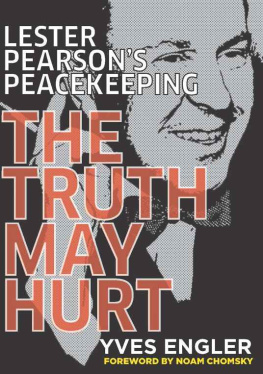Ronald Niezen - Truth and Indignation: Canadas Truth and Reconciliation Commission on Indian Residential Schools
Here you can read online Ronald Niezen - Truth and Indignation: Canadas Truth and Reconciliation Commission on Indian Residential Schools full text of the book (entire story) in english for free. Download pdf and epub, get meaning, cover and reviews about this ebook. year: 2017, publisher: University of Toronto Press, genre: Politics. Description of the work, (preface) as well as reviews are available. Best literature library LitArk.com created for fans of good reading and offers a wide selection of genres:
Romance novel
Science fiction
Adventure
Detective
Science
History
Home and family
Prose
Art
Politics
Computer
Non-fiction
Religion
Business
Children
Humor
Choose a favorite category and find really read worthwhile books. Enjoy immersion in the world of imagination, feel the emotions of the characters or learn something new for yourself, make an fascinating discovery.
- Book:Truth and Indignation: Canadas Truth and Reconciliation Commission on Indian Residential Schools
- Author:
- Publisher:University of Toronto Press
- Genre:
- Year:2017
- Rating:4 / 5
- Favourites:Add to favourites
- Your mark:
- 80
- 1
- 2
- 3
- 4
- 5
Truth and Indignation: Canadas Truth and Reconciliation Commission on Indian Residential Schools: summary, description and annotation
We offer to read an annotation, description, summary or preface (depends on what the author of the book "Truth and Indignation: Canadas Truth and Reconciliation Commission on Indian Residential Schools" wrote himself). If you haven't found the necessary information about the book — write in the comments, we will try to find it.
Thoughtful, provocative, and uncompromising in the need to tell the truth as he sees it, Niezen offers an important contribution to understanding truth and reconciliation processes in general, and the Canadian experience in particular.
Ronald Niezen: author's other books
Who wrote Truth and Indignation: Canadas Truth and Reconciliation Commission on Indian Residential Schools? Find out the surname, the name of the author of the book and a list of all author's works by series.
Truth and Indignation: Canadas Truth and Reconciliation Commission on Indian Residential Schools — read online for free the complete book (whole text) full work
Below is the text of the book, divided by pages. System saving the place of the last page read, allows you to conveniently read the book "Truth and Indignation: Canadas Truth and Reconciliation Commission on Indian Residential Schools" online for free, without having to search again every time where you left off. Put a bookmark, and you can go to the page where you finished reading at any time.
Font size:
Interval:
Bookmark:

Copyright University of Toronto Press 2017
Higher Education Division
www.utorontopress.com
All rights reserved. The use of any part of this publication reproduced, transmitted in any form or by any means, electronic, mechanical, photocopying, recording, or otherwise, or stored in a retrieval system, without prior written consent of the publisheror in the case of photocopying, a licence from Access Copyright (the Canadian Copyright Licensing Agency) 32056 Wellesley Street West, Toronto, Ontario, m5s 2s3is an infringement of the copyright law.
Library and Archives Canada Cataloguing in Publication
Niezen, Ronald, author
Truth and indignation : Canada's Truth and Reconciliation Commission on Indian residential schools / Ronald Niezen. Second edition.
(Teaching culture : UTP ethnographies for the classroom)
Includes bibliographical references and index.
Issued in print and electronic formats.
ISBN 978-1-4875-9438-1 (softcover).ISBN 978-1-4875-9440-4 (PDF). ISBN 978-1-4875-9439-8 (EPUB)
1.Truth and Reconciliation Commission of Canada. 2.Native peoples CanadaResidential schools. 3.Truth commissionsSocial aspectsCanada. 4.Ethnological jurisprudenceCanada. I.Title. II.Series:Teaching culture
e96.5.n54 2017371.829'97071c2017-903405-7c2017-903406-5
We welcome comments and suggestions regarding any aspect of our publicationsplease feel free to contact us at
North America
5201 Dufferin Street
North York, Ontario, Canada, M3H 5T8
2250 Military Road
Tonawanda, New York, USA, 14150
ORDERS PHONE : 1-800-565-9523
ORDERS FAX : 1-800-221-9985
ORDERS E-MAIL :
UK, Ireland, and continental Europe
NBN International
Estover Road, Plymouth, PL6 7PY, UK
ORDERS PHONE : 44 (0) 1752 202301
ORDERS FAX : 44 (0) 1752 202333
ORDERS E-MAIL :
Every effort has been made to contact copyright holders; in the event of an error or omission, please notify the publisher.
This book is printed on paper containing 100% post-consumer fibre.
The University of Toronto Press acknowledges the financial support for its publishing activities of the Government of Canada through the Canada Book Fund.
Printed in the United States of America.
| AFN | Assembly of First Nations |
| AHF | Aboriginal Healing Foundation |
| CBC | Canadian Broadcasting Corporation |
| CEP | Common Experience Payment |
| FPIC | free, prior, and informed consent |
| IAP | Independent Assessment Process |
| IRS | Indian residential school(s) |
| IRSSA | Indian Residential School Settlement Agreement |
| NABS | Native American Boarding School Healing Coalition |
| POI | Person(s) of Interest |
| PTSD | post-traumatic stress disorder |
| RCAP | Royal Commission on Aboriginal Peoples |
| RCMP | Royal Canadian Mounted Police |
| RHSW | Resolution Health Support Worker |
| TRC | Truth and Reconciliation Commission of Canada |
This second edition of Truth and Indignation was planned from the beginning. When the project began, the Truth and Reconciliation Commission (TRC) on Indian Residential Schools had not yet started its hearings and I did not know quite what to expect. Once things were under way, however, it did not take long to see how the Commission had chosen to approach statement gathering, to make ritual and symbolic forms of expression a central part of its activities, and in particular how it was limited by its mandate to what I now call survivor centric or (comparatively) victim centric forms of inquiry from certain individuals and not others. Under these circumstances, it seemed a good idea to produce a book while the Commission was still engaged in its work. This rationale was also connected to a commitment to truth or to the procedural logic of scholarly inquiry. In an institutional process of limited duration like the TRC, it is impossible for observations and conclusions to be checked against reality after the fact. By coming out with the book a year before the Commission was to submit its final report (two years, as it happened), the intention was to allow critics to check my observations against subsequent events of the Commission as it continued its work. Of course, there was always the risk that the Commission would change course and start doing something different, or that audiences in the remaining events would respond differently. As it turned out, the Commission remained remarkably consistent, despite the diversity of the indigenous peoples in Canada whose legacies of residential school experiences it was intended to address. The conditions were there for a contribution to productive critical engagement in the scholarship on the Truth and Reconciliation Commission.
That this did not happenand more precisely how this did not happenwas to me the most surprising result of this books early appearance. When I gave public talks, objections to the content of the first edition of this book focused on its presentation of narratives from the priests, brothers, and nuns who had been involved one way or another in the operation of the schools. One statement from an audience member, who identified herself as a residential school survivor, in the question period of a talk I gave at the Faculty of Law at McGill University has stood out in my memory as expressing the sentiment behind these objections particularly well: The priests have had the dominant discourse for more than 150 years. Now its our turn. (I honestly cannot remember how I replied.) This statement succinctly expresses a view of truth and history that is very important, and that in some ways defines the times. There is an argument here for privileging the voices of the once dominated. Truth has an inverse relationship to power. There is an us and them quality to legitimate knowledge, implying an element of political resurgence. All of this ran squarely against my (perhaps naive) intuition that the sense of offence and exclusion toward the work of the Commission by many of the people who ran the schools was something that needed to be written about and better understood.
This second edition is therefore centrally concerned with a problem of knowledge, the emergence of regimes of truth through public inquiry, and the production of history in the context of political mobilization and the quest for social justice. In taking on this topic, I have chosen to leave the text of the book largely unchanged, with only minor additions, updates, and corrections, leaving the substance of new work in an epilogue. Here my intention is first to bring the reader up to date with the work of the Commission and the public and institutional responses to the submission of its final report in December 2015. To this I have added some further reflections on the TRC and the problem of knowledge, presented in a wider context that considers victim centrism as an emerging aspect of the global project of transitional justice.
Ronald Niezen
Montreal, April 2017
The subject of Indian residential schools doesnt easily let go once it has gotten hold. It has all the markings of a cause that provokes a kind of persistent, nagging, sympathetic sense of wrong: the desecration of childrens innocence by those with spiritual and institutional authority over them, the political harm inherent in policies of state-sanctioned assimilation, and government and church avoidance and obstruction of the work of the Commission, recalling their characterization by a peer reviewer of this book as unrepentant, morally tainted perpetrator institutions. But I was also motivated to write this book by an additional perspective. An important incentive was provided by the opportunity to include the remembrances of residential schools and efforts to overcome their legacy by former educatorsabove all Oblate priests, brothers, and nuns, some of whom had worked in the schools and some who had not. This came about in 2009 when my research assistant, Marie-Pierre Gadoua, pursuing her doctoral project on Thule and Inuit artefacts in the collections of the Oblates Deschtelets residence in Ottawa, became aware of the priests unusual (from the perspective of dominant public discourse) views concerning the history of these schools and the (then) recently implemented regimes of compensation and the Truth and Reconciliation Commission. In response to this information, I initiated a series of interviews at the Deschtelets residence, which Marie-Pierre and I did singly or together, and which soon developed into what might be described as a national-scale campaign (international if one includes an interview done by Marie-Pierre in Rome) to follow through on the willingness of the Catholic clergy to put on record their views about the history of the schools and about the impact on their lives of the Independent Assessment Process (discussed in inquiry to include local, regional, and national events, as well as interviews with organizers and participants.
Font size:
Interval:
Bookmark:
Similar books «Truth and Indignation: Canadas Truth and Reconciliation Commission on Indian Residential Schools»
Look at similar books to Truth and Indignation: Canadas Truth and Reconciliation Commission on Indian Residential Schools. We have selected literature similar in name and meaning in the hope of providing readers with more options to find new, interesting, not yet read works.
Discussion, reviews of the book Truth and Indignation: Canadas Truth and Reconciliation Commission on Indian Residential Schools and just readers' own opinions. Leave your comments, write what you think about the work, its meaning or the main characters. Specify what exactly you liked and what you didn't like, and why you think so.

